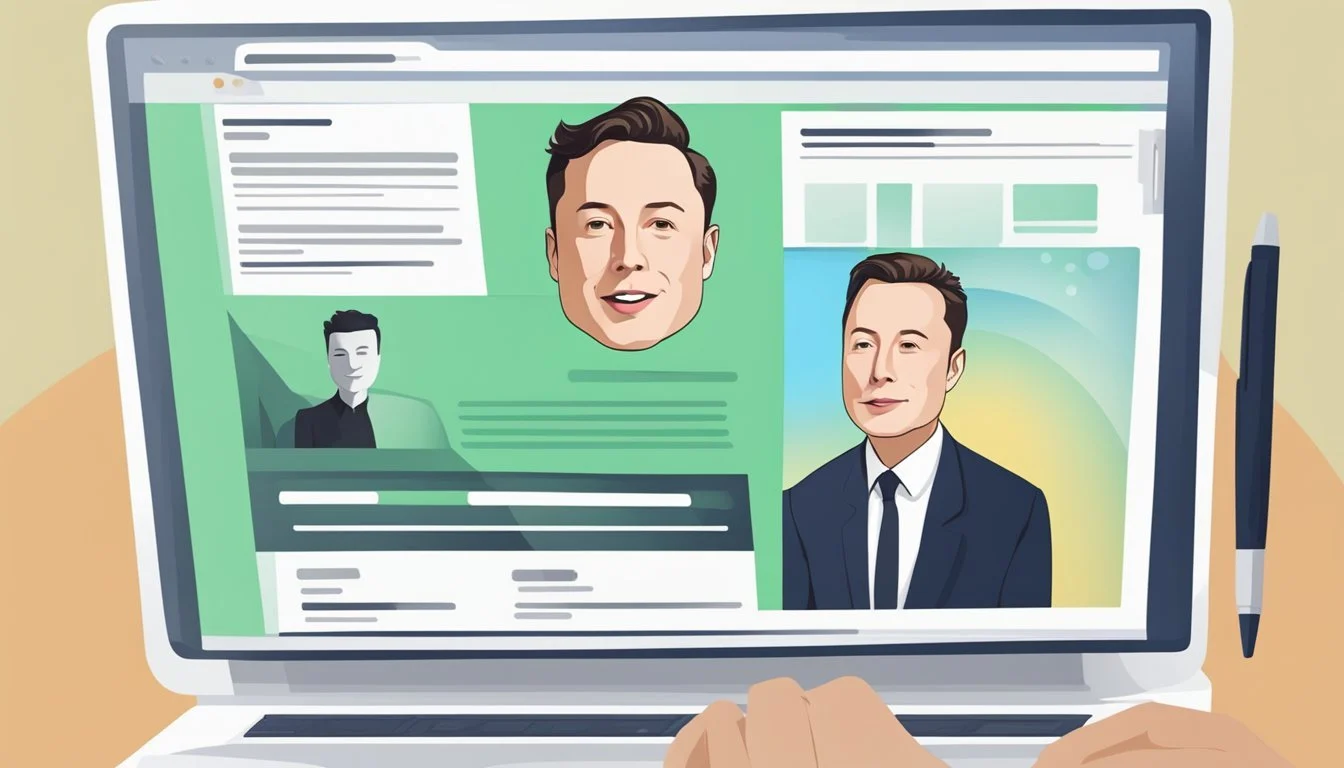Musk's $1M/Day Vote Grab: Sign His Petition, Get Rich Quick in Shocking Election Scheme!
Elon Musk's latest initiative aims to engage voters in swing states through a petition linked to substantial financial incentives. The billionaire entrepreneur has pledged to give away $1 million daily until the November election to individuals who sign his online petition for registered voters. This unprecedented move has caught the attention of many, with Musk's pro-Trump PAC reporting that over 87,000 checks have already been mailed out to participants.
The petition focuses on supporting the First and Second Amendments, reflecting Musk's commitment to free speech and the right to bear arms. Participants are not only signing a document but also potentially earning money through various payment programs. These programs reward signers and those who refer others to the petition, creating a ripple effect of engagement across swing states.
As the election approaches, this petition strategy has sparked discussions about voter mobilization and the role of private wealth in political processes. With millions of dollars at stake, Musk's initiative has undoubtedly captured public interest and may influence voter participation in key battleground states.
The Petition Phenomenon
Elon Musk's petition initiative has sparked widespread attention and debate. The campaign offers significant financial incentives to voters in key states for signing a petition, raising questions about its impact on free speech and political engagement.
Origins and Purpose
The petition originated from Elon Musk's political action committee. It aims to support the Constitution and encourage voter participation. Musk pledged to give away $1 million daily until the November election to individuals who sign the online petition for registered voters.
This unprecedented move combines digital activism with financial incentives. The purpose appears twofold: to raise awareness about constitutional issues and to mobilize voters in swing states.
Scope and Reach
The petition's scope is primarily focused on key swing states. Reports indicate that over 87,000 checks have been mailed to participants. This suggests a substantial reach and engagement level among voters.
The campaign targets registered voters, potentially influencing electoral outcomes. Its digital nature allows for rapid spread and easy participation. The financial incentive of $1 million per day has undoubtedly contributed to its widespread attention and participation.
Impact on Free Speech and Digital Platforms
Musk's petition initiative has ignited discussions about free speech in the digital age. It demonstrates the power of social media and digital platforms in shaping political discourse.
The campaign's use of financial incentives for political engagement raises ethical questions. Critics argue it may blur the lines between free speech and paid advocacy. Supporters view it as a novel approach to encouraging civic participation.
This phenomenon highlights the evolving landscape of political campaigns in the digital era. It showcases how technology and social media can be leveraged for mass engagement in political processes.
Elon Musk: A Profile
Elon Musk is a prominent entrepreneur and billionaire known for his innovative ventures and political activities. His business pursuits have transformed multiple industries, while his wealth has enabled significant political contributions.
Business Ventures and Influence
Elon Musk co-founded PayPal, revolutionizing online payments. He later founded SpaceX, aiming to reduce space transportation costs and enable Mars colonization.
In 2004, Musk joined Tesla Motors as chairman, becoming CEO in 2008. Under his leadership, Tesla has become a leading electric vehicle manufacturer and clean energy company.
Musk's other ventures include Neuralink, developing brain-computer interfaces, and The Boring Company, focused on tunnel construction and transportation infrastructure.
His companies have disrupted traditional industries and pushed technological boundaries. Musk's influence extends beyond business, with his social media presence and public statements often making headlines.
Net Worth and Political Contributions
As of December 2024, Elon Musk's net worth fluctuates but remains among the highest globally. His wealth primarily stems from his stakes in Tesla and SpaceX.
Musk has become increasingly involved in politics. He founded a Political Action Committee (PAC) to support specific values and constitutional amendments.
In 2024, Musk pledged to give away $1 million daily until the November election to individuals signing his PAC's petition. This move raised questions about campaign finance regulations.
His political activities have included substantial donations and public endorsements of candidates. Musk's financial resources and public platform allow him to exert considerable influence on political discourse.
Voter Participation and Engagement
Efforts to increase voter participation often involve registration drives and incentives. These initiatives aim to boost civic engagement and turnout, especially in key swing states.
Voter Registration Drives
Voter registration drives target eligible citizens who are not yet registered to vote. These campaigns often focus on underrepresented communities and areas with historically low turnout. Organizations may set up booths at public events, go door-to-door, or use online platforms to reach potential voters.
In swing states, registration efforts intensify as elections approach. Volunteers and campaign staff work to ensure eligible residents are registered before deadlines. Some drives offer assistance with completing forms and understanding registration requirements.
The Role of Giveaways and Incentives
Giveaways and monetary incentives have emerged as controversial tools to encourage voter engagement. Elon Musk's $1 million daily giveaway for petition signers is a high-profile example. The offer targets registered voters in swing states, aiming to influence turnout.
Critics argue such incentives may violate election laws. Supporters claim they increase civic participation. The legality and ethics of these tactics remain hotly debated. Regardless, they highlight the intense focus on mobilizing voters in crucial electoral battlegrounds.
Incentives can range from small items like stickers to substantial cash prizes. Their effectiveness in boosting long-term civic engagement is still being studied.
Legal and Ethical Considerations
Elon Musk's petition initiative raises significant legal questions regarding campaign finance, election law, and federal oversight. The offer of monetary rewards for signing a political petition in swing states has sparked debate among legal experts and election officials.
Campaign Finance Regulations
The Federal Election Campaign Act prohibits corporations from making direct contributions to federal candidates or political committees. Musk's America PAC initiative may fall into a legal gray area.
Election law expert Rick Hasen notes that while individuals can spend unlimited amounts on independent political speech, paying voters directly is problematic. The DOJ could potentially view the petition payments as attempts to influence voting behavior.
Some argue the initiative qualifies as protected political speech. Others contend it violates laws against vote buying or coercion. The FEC will likely need to provide guidance on this novel use of PAC funds.
Election Law Insights
State laws vary on what constitutes illegal voter inducement. In some states, offering any valuable consideration in exchange for voting or registering to vote is prohibited.
The petition's focus on constitutional rights rather than specific candidates may provide some legal cover. However, the targeting of swing states raises questions about intent to influence elections.
Legal experts suggest the initiative treads a fine line between protected speech and improper voter influence. Courts may need to weigh First Amendment protections against potential harms to election integrity.
Federal Election Commission Oversight
The FEC has jurisdiction over federal campaign finance law enforcement. They will likely investigate whether the petition payments violate regulations on coordinated expenditures or in-kind contributions.
Key considerations include:
Whether the initiative qualifies as independent expenditure or coordinated activity
If petition signers constitute a mailing list with monetary value to campaigns
Potential reporting requirements for America PAC
The commission may need to issue new rules or advisory opinions to address this novel use of PAC funds. Their decision could have far-reaching implications for future political organizing and spending.
The Political Climate in Key Swing States
Swing states play a pivotal role in determining the outcome of U.S. presidential elections. These battleground states have closely divided electorates and often switch between supporting Republican and Democratic candidates.
Swing State Dynamics
Pennsylvania, Michigan, Wisconsin, and Arizona are considered crucial swing states in recent elections. These states have shown fluctuating voter preferences, making them key targets for political campaigns.
Pennsylvania has alternated between parties in the last three presidential elections. The state's mix of urban, suburban, and rural voters creates a complex political landscape.
Michigan and Wisconsin, part of the "Blue Wall," unexpectedly flipped Republican in 2016 but returned to the Democratic column in 2020. Economic issues and union influence remain significant factors in these states.
Arizona, traditionally Republican-leaning, has become more competitive. Changing demographics and urbanization in Maricopa County have shifted the state's political balance.
Historical Voting Patterns and Predictions
Florida and Ohio have been reliable bellwethers in past elections, but their predictive power has diminished. Florida has leaned more Republican in recent cycles, while Ohio has shown a similar trend.
North Carolina and Georgia have emerged as new battlegrounds. North Carolina has been closely contested in the last four presidential elections. Georgia's urban growth has made it more competitive, evidenced by its flip to the Democratic column in 2020.
Nevada, despite its Democratic lean in recent presidential elections, remains a swing state due to its volatile electorate. The state's large Latino population and tourism-dependent economy influence its voting patterns.
Predictions for upcoming elections remain uncertain. Factors such as economic conditions, candidate appeal, and voter turnout will shape outcomes in these key swing states.
Second Amendment Rights and Political Activism
The Second Amendment remains a contentious issue in American politics, sparking intense debates and grassroots activism. Gun rights advocates and opponents frequently clash over interpretations of constitutional provisions and their modern-day applications.
Constitutional Provisions and Debates
The Second Amendment states: "A well regulated Militia, being necessary to the security of a free State, the right of the people to keep and bear Arms, shall not be infringed." This 27-word sentence has generated extensive legal and political discourse.
The Supreme Court's 2008 District of Columbia v. Heller decision affirmed an individual right to bear arms. Critics argue this interpretation ignores the "well regulated Militia" clause. Supporters claim it preserves a fundamental liberty.
State and federal legislatures grapple with balancing public safety concerns against constitutional rights. Proposals range from expanded background checks to assault weapon bans.
Grassroots Movements and Advocacy
Gun rights organizations mobilize supporters through rallies, petitions, and lobbying efforts. The National Rifle Association (NRA) remains a powerful force in Second Amendment advocacy.
In 2023, a pro-gun rally in Harrisburg, Pennsylvania drew thousands of attendees. Speakers emphasized constitutional rights and opposed new firearms restrictions.
Online petitions have become a popular tool for both sides of the debate. Social media amplifies these efforts, allowing rapid dissemination of information and calls to action.
Grassroots gun control groups have also gained momentum in recent years. They organize marches, boycotts, and voter registration drives to push for stricter regulations.
Incentives and Political Strategy
Elon Musk's petition campaign employs financial incentives to boost voter engagement and support for specific constitutional rights. This strategy raises questions about its impact on voter turnout and the ethical implications of monetary rewards in politics.
Economic Stimuli and Voter Turnout
Musk's America PAC offers $47 to individuals who refer registered swing-state voters to sign a petition supporting the First and Second Amendments. The campaign targets key battleground states like Pennsylvania, Georgia, Nevada, Arizona, Michigan, Wisconsin, and North Carolina. This cash incentive aims to increase voter participation and awareness of constitutional issues.
The billionaire has pledged to give away $1 million daily until Election Day through a sweepstakes-style giveaway. Registered voters who sign the petition are entered for a chance to win substantial cash prizes. This approach combines elements of economic stimulus with political activism.
The Ethics of Monetary Incentives
The use of financial incentives in political campaigns has sparked debate over campaign finance ethics. Pennsylvania Governor Josh Shapiro expressed serious concerns about Musk's initiative. Critics argue that cash handouts may unduly influence voter behavior or decision-making processes.
Supporters view the giveaway as a novel approach to engage citizens in the political process. They contend that the financial rewards simply encourage participation rather than dictate voting choices. The legality of the campaign was challenged but upheld by a Pennsylvania state judge, who refused to halt the sweepstakes.
The strategy blurs the lines between traditional campaign finance, voter outreach, and economic incentives. It raises questions about the potential long-term effects on political engagement and the role of wealth in shaping public discourse.
Notable Figures and their Roles
Elon Musk's petition initiative has drawn attention from various influential individuals. Their involvement has shaped public discourse and legal debates surrounding the campaign.
Influencers of Public Opinion
Elon Musk stands at the forefront of this petition movement. His $1 million daily cash giveaway has sparked widespread interest and controversy. The tech billionaire's promise of $100 to Pennsylvania voters who sign his petition supporting the First and Second Amendments has garnered significant attention.
Donald Trump's stance on the petition remains a topic of speculation. His influence on Republican voters could potentially impact the petition's reach and effectiveness.
Rick Hasen, a prominent election law expert, has likely weighed in on the legality of Musk's cash incentives. His opinions could sway public perception and potentially influence legal challenges.
Key Spokespersons and Their Messages
John Dreher, the first winner of Musk's $1 million initiative, has become an unexpected spokesperson. His experience at the America PAC-hosted event in Harrisburg, Pennsylvania, on October 19, 2024, has drawn media attention.
Meet the Press, a influential political talk show, may have featured discussions about the petition's implications. Their coverage could significantly impact public understanding of the initiative.
A group of 11 former Republican officials have raised questions about the legality of Musk's voter incentives. Their collective voice adds weight to the ongoing debate surrounding the petition's legitimacy.
Ari Allyn-Feuer, a 35-year-old scientist and member of the Chester County Democratic Committee, represents an unexpected supporter. His decision to sign the petition despite political affiliations highlights the complex dynamics at play.
Election Integrity and Legal Challenges
Elon Musk's petition and $1 million daily giveaway have sparked debates about election integrity and potential legal issues. The controversial campaign has drawn scrutiny from various quarters.
Allegations and Investigations of Voter Fraud
Claims of voter fraud have emerged surrounding Musk's petition. Some critics argue that the financial incentive could unduly influence voters. The Federal Election Commission is reviewing complaints about the campaign's legality.
Investigations are underway to determine if any election crimes occurred. Authorities are examining whether the petition and giveaway violate laws against vote buying or coercion.
Several voters who signed the petition have filed lawsuits. They allege fraudulent misrepresentation in how winners were selected for the daily prize.
The Role of Federal and State Oversight Bodies
The Federal Election Commission is the primary agency overseeing the situation. They are assessing whether Musk's campaign complies with campaign finance regulations.
State election boards are also involved, examining potential violations of local laws. Some states have stricter rules about voter incentives and could take separate action.
Watchdog groups are calling for greater transparency. They want details on the funding sources behind Musk's political action committee, citing concerns about dark money influence.
Legal experts remain divided on the campaign's permissibility. The case may set new precedents for digital-age election practices and voter engagement tactics.




